Picking the brain of Darren Smith
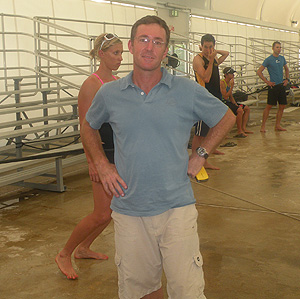
Coach Darren Smith has built up quite a reputation as a coach, and the success of some of his athletes has really put him in the limelight. Slowtwitch had the opportunity to have a few words with Coach Daz.
Slowtwitch: Good to speak with you coach and it appears that you are quite busy.
Darren: Thanks, Herbert. Yes, plenty going on. This morning we had a bike session, then a team meeting with some of the coaches and the massage therapist. Later we were constructing swim paddles and the next minute we are on to something else. Never a dull moment.
ST: We didn’t know that you were a paddle manufacturer.
ST: Ha, Ha. We sometimes have to make paddles for the athletes who have odd bits going on with their strokes. We’ll make specific ones for straightening somebody’s stroke out, or stopping them from gliding too much or stopping them from moving their hands – all that sort of stuff. A new athlete just arrived, and at his first swim we had a good look at him and so this morning we made some specific equipment to help him.
ST: So where does this new male recruit bring you in terms of males in your squad?
Darren: Although I guess we were largely known as a girls team, we do have 5 guys in the team of 12. We have got Andy (Giglmayr) who has been with us since mid ‘09 and while it is fair to say it has been a big overhaul, we were delighted when he ended up 15th in the Budapest Final. Breaking into the top 15 for in the WCS for boys is pretty good I feel. We also have Bryan Keane from Ireland. He came during the year and after about a month or so we got him swimming much better and after making his first swim pack he came 7th in the world sprint titles so this signals that he also is a guy with real potential. We have Ozzie Dave Matthews who you have met before and is a real character. After a really quick jump to WCS racing early 2010 it became clear that this level was a bit too high so we sent him off to the quality races around Europe to get through this most recent off season phase where we are now working hard to bridge the gap. I also have Michael Gosman, an Australian junior who represented Australia at the Youth Olympics and came second at the World Duathlon Championships. So again, he is someone whom I am teaching how to swim. Finally, our new recruit named Bart Aernouts – he comes from Belgium and he is the current World Duathlon champion. So there is a bit of a theme with the boys: They are all pretty decent runners and most of them are very good bike riders, so our biggest investment to date is related to their swim. It is not a simple process but we have made great gains with them all, because frankly whatever I ask them to do gets done and done really well. It is certainly different to standard swim programs, and they have learnt to suck it up and do all the dumb bits I ask them to, no matter how stupid they may look!
ST: I guess the women have been a bit more in the limelight.
Darren: The ladies are all superstars, and despite driving me nuts at times, we think they are all brilliant. I guess the only one that hasn’t had that much exposure in recent years is Lauren Groves (now Lauren Campbell), and few others have probably slipped in under the radar but are now world top ten ranked. Lauren, or Gunzy as we call her is absolutely lovely and I am delighted to have her join us. She was a bit broken I gotta say and did not swim for 8 months last year plus had reoccurring injuries to the lower limbs, but I’m very pleased to say she is a very different athlete now. All the others have been out there – Sarah Groff (USA), Barbara Riveros-Dias (CHI) and Lisa Norden (SWE), well, maybe not too many people know Kate Roberts (RSA) or Vicky Holland (UK) who are the ones I mentioned before about slipping in under the radar.
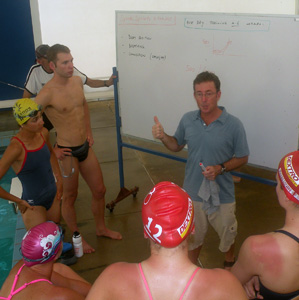
ST: With Lauren Campbell finding a new life with you, is it all about finding the right coach-athlete match?
Darren: I believe so, but the truth is it just doesn’t happen overnight and for a number of my current athletes we didn’t have great success from the get go. Often it is year two where things really take off, in part because the way we work is often quite different to other well known coaches whom many of the athletes have worked with before coming our way. Last year was a terrific year for many of them, and I’m certainly not afraid to say was a pretty average year for some others. Coaching is a bit like that! Groffy for one had a tough year with a number of issues including broken bones and bits and some real screw ups on my behalf. Vendula Frintova from Czech Republic and 2009 World duathlon champion, won the first World Cup of 2010 in Mooloolaba and then went backwards after that. If we get it right this year they will all of course be potential podium athletes, but it was clear that we didn’t have the whole package together. Barb also started strong but faded. Others to their credit just kept doing a great job all year long without fuss…proving it is easy once you get it right, but tough when things are missing.
However the version of coach I am in 2010 or before may not be the best option for 2011 onwards for any or all of the athletes unless I adapt. So each year I want them to ask themselves whether I have got the skills to take them further. If a stock market share has done well for you in the past you have a bit of a favoritism towards it, but really if you have a good business brain you’ll ask yourself what has this share got for me now. I am grateful it went up 20%, that is all well and good, but if it is not going to take me up another 5, 10 or 20% then maybe there is something else I should invest in. That way of approaching things really keeps me on my toes, and gives the chance for the athletes to give me very direct feedback. I have to demonstrate to them that the system is better for next year and we definitely don’t get to rest on our laurels. They are all incidentally reviewing this week whether the structure we have for this year is spot on and better than last year.
ST: Was the early season success of Barbara Riveros Diaz maybe a bit too much pressure for her?
Darren: Put it this way, she came 5th in Hamburg WCS the year before and also won a French Grand Prix race, so she was an athlete with great potential and a lot of it had been brought to the surface through the her hard work and her former coach Jamie Turner of Australia. She is 22-years old and it was delightful and exciting for her at the early stages of 2010 to be at the level she had dreamt one day to achieve. I would say that pressure is an interesting word, but not the right one to attach to Barb. When you are on your way up you have a small bunch of backers and that is the coach and a few other long-term supporters. When you are World #1 for 4 months you probably have 20 different advisors that come out of the woodwork and it is also very easy to get distracted – you get sponsorship offers, are in the media, make good money and all the rest of it. Now on this point Barb didn’t do such a bad job for someone so young, but I think this is where it really tests a coaching relationship. Clarifying and de-cluttering an athletes’ existence is essential at such a stage.
I would probably suggest that some other issues were related to fundamentals. She made some really significant errors before and during races for one reason or another and I am certain that she has learnt from those experiences. She is quite something so expect to see her better than ever in 2011.
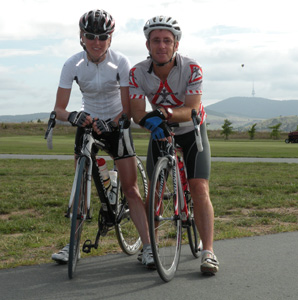
ST: Lisa Norden had a very good year and seems to be quite the fighter.
Darren: She fights in races and she trains exceptionally well and is a role model to those in our squad and athletes worldwide. Lisa has always been the benchmark in most aspects of training and learning, and we all see the result of that dedication on race day.
ST: The Olympics aren’t that far away. Any thoughts?
Darren: I made a few decisions about an Olympic cycle and working with younger athletes. The athletes that I coach don’t get pushed very hard at all in the first 2 years of the Olympic cycle…a time to race lots, learn more and have a bit of ‘color’ in their lives. Right now that means they are really fresh, excited and focused on a great 18-month phase. The last thing I want to do is push them too hard where you absolutely get the best out of yourself during the first year of the Olympic cycle, the second year everybody catches up, the third year you are not sure if you have enough left and the fourth year when it matters you have nowhere to go. We’ve seen some WCS athletes make that mistake already I believe.
The first 2 years we were quite relaxed and a number of the athletes raced with a few extra pounds and were not trained to 100% capacity. In the next 2 years we’ll turn on the afterburners a bit. I’m not being soft on them, but just figure it to be a good strategy in the long run.
ST: You recently added massage therapist Victor Carapelho to your squad and mentioned a sports nutrition person. How big is your support crew?
Darren: We have a great team who has been hand picked and each is world class with either PhDs or specialist qualifications, a desire and personality to really fit in with the team values, and whom are great face to face operators. These talented individuals cultivate a group of other talented people (the athletes).
Victor is Portuguese and worked for many years with one of the best coaches, Sergio Santos and best athletes, Vanessa Fernandes and is now full time with us. Dr Liz Broad, our dietitian is brilliant and same with Dr Russell Martindale our sport psych and Roz Penfold our specialist sport physiotherapist who all work part time but spend time at camps or races here and overseas. To complete the main ‘ inner team’ we have my assistant coach, Stewart Crowley from Australia whom I have found a really great asset. He is like the good cop and I am the bad cop…which every squad needs. We have an extended team, who I draw upon for knowledge or advice including Michael O’Neil of the US for all things concerned with branding/PR etc, Bo and Liz Hanson from Athleteassessments.com, and Phil King, businessman and former Olympic gold medal coach, plus a bunch of experts in just about every aspect important to our sport disciplines or operation. They are too numerous to mention, but basically I annoy a lot of people! We also, as a team, bring over people for periods of time who can add significantly with their expertise. These include Rob Higley a running guru direct from the Rift Valley, Kenya and Ukraine swim coach Yuriy V. It’s pretty simple, and to quote a smart guy who knows the team well, ‘I’ve assembled a team of special people, talented and expert in their respective fields all working together to cultivate another group of special people (the athletes)’.
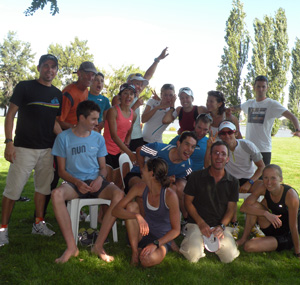
ST: Why the squad versus being a federation coach?
Darren: I have been a federation coach in the past having started the Queensland Academy of Sport triathlon program here in Australia in the late 90’s. I then went overseas to run a national program to see if I was good enough. I picked Scotland, which at the time I thought was effectively the worst place I could find in the world to produce athletes because of environmental constraints, lack of athletes or role models and funding. I figured if I could do well there that would mean I was pretty decent and fortunately for me we did have some success with a few of the athletes from the program whom you all might know still racing at a very good level today: Catriona Morrison, Fraser Cartmell and Bella Bayliss. In general it was a great learning opportunity for me, however, I probably learned more about politics than I ever wanted to and you have to put up with that I guess for a while in most federation posts I know of. I came back to Australia after those few years away and the system here wasn’t really accepting of someone like me. So for me a great thing happened. I took a sabbatical to do something totally different (building some houses), and to have time to reflect. The truth is that I thought about coaching for every second of every day through that time and not only that, I planned the journey that I am now on to be a world ranked coach. If I hadn’t been thinking about coaching every day I would have known it wasn’t for me. But it was in my blood and I wanted to do it.
ST: Have you ever regretted the decision to pursue the squad coaching dream?
Darren: I think everyone has to pick what is available and what suits them. What I do know is I wanted to achieve something in coaching and I thought I may have the skills to do well, and we now have a great team of athletes and staff that are pursuing London 2012 with a lot of energy. It is a great environment to be a part of, and makes me very proud. I also know that from a personal point of view, being a bit on the edge and not safe with a cushy position, a constant wage etc really pushes me harder, and in due course makes me better at what I do. If I don’t really deliver then I don’t get paid, and I like that. I have had offers over the past 4-5 years for federation posts but I have a very strong commitment to the athletes I work with and the goals that I set myself, so the answer has always been no. So at this stage these is absolutely no regret. At some stage I would probably like to be part of Federation if it was done properly, but if not then I am really very happy doing what I am now or expanding a bit to include more mentoring of other coaches, which I currently do and get a real sense of satisfaction from. I don’t think there were enough mentors for coaches like me a few years ago. Without trying to sound immodest, if I no longer enjoy what I do then I’ll change to something else, because I am really lucky in being good at a few things. I guess at this stage I am one of the really lucky ones who has not had to work too many days in his life yet…coaching is my passionate hobby.
ST: Anything else we should know?
Darren: Just that I enjoy life and have a terrific wife who allows me great freedom to pursue my dreams. Thanks to the athletes I have been fortunate to have worked with for their patience while I was ‘getting it together’, and thanks to brilliant coaches in our sport such as Brett Sutton, Lance Watson and others who are in recent times, Olympic medal producing coaches, for inspiration. I started off life in the mid 90s as Sutto’s ‘sports scientist’ would you believe (now that is one for the books), and I must say it was a proud day when a few years ago I got a message from him effectively saying that I had ‘done real good and for me to slow down as I was starting to kick his butt’. We all know that without people to chase we don’t push as hard as we can, so thanks to those coaches before me, and thanks to those cheeky hungry younger ones who want to knock me off. Make sure you come up and say hi because we share a similar passion.
Final point is that part of the squad ethos is based on hard work, simplicity, and a good attitude. We just cover the little things that get overlooked by others and lead to problems, and work on the simplicity of creating good habits in training that translate come race day. They are just proven techniques in business, life and sport and lead to success…but I and the team reinforce this to our athletes every day, no question.


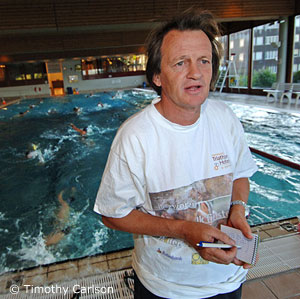

Start the discussion at slowtwitch.northend.network